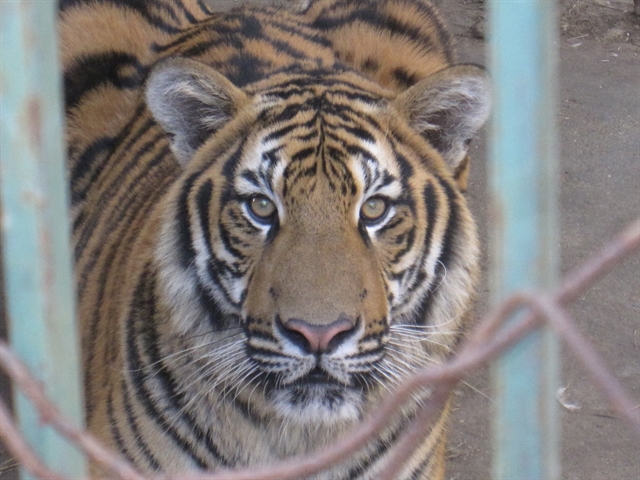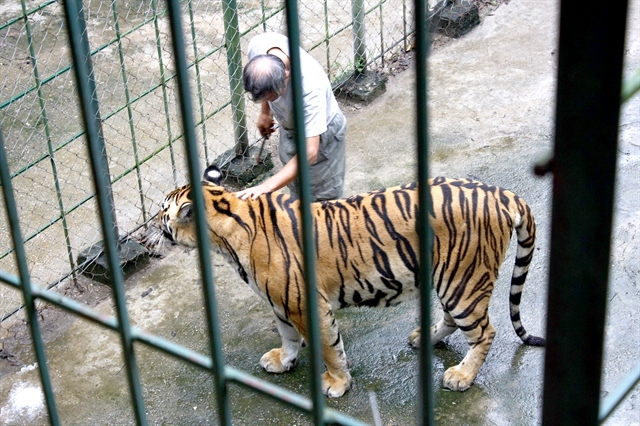 Environment
Environment

 |
| A tiger in captivity on a farm in Việt Nam. Authorities are stepping up efforts to end private ownership of tigers for breeding. — Photo courtesy of WWF Việt Nam |
BÌNH DƯƠNG — A collection of biopsy samples from 26 captive tigers for DNA analysis was completed at Đại Nam Zoo in the southern province of Bình Dương.
The sampling was part of a joint-action programme by the National Forest Protection Department (FPD), the Southern Bình Dương FPD, the Institute for Environment and Biodiversity Research (IEBR), the Đắk Lắk Elephant Conservation Centre, WWF and Four Paws.
WWF-Vietnam said in a statement that the biopsy sampling was organised under the USAID Saving Threatened Wildlife project and implemented by the Management Board of Forestry Projects (MBFP)/MARD and WWF as part of a pilot programme with the National FPD.
The pilot project will collate captive tiger DNA and stripe patterns on a national database and provide recommendations to officials for improving the monitoring and management of captive tigers.
Biopsy sampling is an expert-handled procedure that involves removing tissue which is then analysed to reveal the unique DNA profile of each tiger.
Images of the tiger’s stripe pattern are also recorded. WWF-Vietnam said that Tiger stripe patterns are as individually unique as human fingerprints, with each animal having its own pattern by which it can be identified.
Tigers are globally endangered and are protected both nationally and internationally under the Convention of International Trade in Endangered Species of Wild Fauna and Flora (CITES). CITES requires all member states to implement measures restricting captive tiger populations to those kept for conservation efforts and strictly prohibits private ownership for breeding purposes.
Recording unique DNA profiles and stripe patterns of captive tigers is part of the Government’s efforts to improve the management of captive tigers as set out under Prime Ministerial Directive 29/CT-TTg, dated July 23, 2020, on urgent solutions to manage wildlife and to ensure compliance with the CITES requirements.
“The National FPD has worked closely with the Saving Threatened Wildlife project to conduct the biopsy sampling of tiger DNA and recording of stripe patterns, and we are looking forward to continuing this collaboration,” said a senior National FPD representative.
The sampling in Bình Dương was the third instance of DNA analysis being undertaken. Two other sites of sampling tigers in the central province of Đắk Nông and the northern Thái Nguyên Province were made in October 2022 and March 2023, respectively, as a result of close collaboration between the National FPD and the USAID Saving Threatened Wildlife project.
Additional sampling will be undertaken before the end of 2023, a WWF Việt Nam spokesperson added.
 |
| A man visits a tiger cage at a private farm in Việt Nam. The National Forest Protection Department (FPD), in collaboration with several wildlife organisations, have collected biopsy samples from 26 captive tigers for DNA analysis. — Photo courtesy of WWF Việt Nam |
Following the sampling in Thái Nguyên, the facility owner Nguyễn Khắc Thương courageously agreed to give up all six of his tigers to the Government after discussions with the National FPD and Thái Nguyên FPD.
The tigers were safely transferred to the Hà Nội Wildlife Rescue Centre in early June, marking a milestone in getting private facilities to transfer captive tigers to state-run facilities.
“The recording of captive tiger DNA and stripe patterns is an important step in being able to monitor and manage captive tigers, not only to meet the requirements of CITES but also to prevent illegal activity driven by the demand for tiger products including tiger-bone glue,” said Michelle Owen, Chief of Party, Saving Threatened Wildlife project, WWF.
The US Government is collaborating with the Government of Việt Nam and local organizations to combat illegal wildlife trafficking in Việt Nam.
The USAID Saving Threatened Wildlife project was implemented under the Ministry of Agriculture of Rural Development (MARD) by WWF, TRAFFIC, and ENV, supporting efforts to counter illegal wildlife trafficking (CWT). — VNS